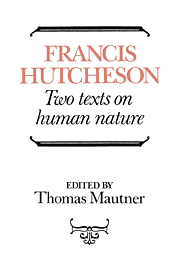Hutcheson's life and work
Published online by Cambridge University Press: 09 October 2009
Summary
Francis Hutcheson inspired David Hume, Adam Smith, Immanuel Kant, and many other eminent moral philosophers. Their fame eventually overshadowed his, and he is now comparatively little known.
Hutcheson's grandfather had, like so many other Scottish Presbyterians, settled in Ulster, where he served as a minister. His son John Hutcheson (d. 1729), the father of Francis, followed him in the same calling. Francis Hutcheson was born in Armagh on 8 August 1694.
His studies began a local school, where he acquired a sound grasp of classical languages, and were continued in a ‘dissenting academy’, one of the schools at more advanced levels which had been set up primarily for the education of students who for religious reasons were unable or unwilling to attend the educational institutions of the Church of England; the universities of Oxford and Cambridge and Trinity College in Dublin being foremost among these. At the age of sixteen Hutcheson moved to the University of Glasgow where, after a year of study, followed by a year's break, he undertook theological studies for for another four years. Having successfully concluded these studies he returned to Ireland, and was made a probationary minister. Not long after, he accepted an invitation to set up an academy in Dublin.
The new venture was a success: Hutcheson even had to find an assistant teacher to help out. During his time in Dublin he also became associated with the circle around Robert, Viscount Molesworth (1656–1725).
- Type
- Chapter
- Information
- Hutcheson: Two Texts on Human Nature , pp. 3 - 7Publisher: Cambridge University PressPrint publication year: 1993



